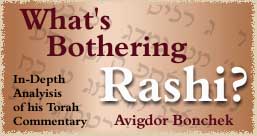

Back to this week's Parsha| Previous Issues
Parashas Bereishis
Last time we asked about a Rashi comment related to Succos. It was from Deutoronomy 16:15 "Seven days you are to celebrate for Hashem your G-d in the place that Hashem will choose; for Hashem will bless you in all your produce and in all your endeavors. And you shall experience pure joy." ("v'hayis ach somayach.") RASHI "According to its plain meaning, this is not a command but an assurance. According to the Talmudic teaching, however, it is derived from here to include the last evening of the festival in the mitzvah of rejoicing." Questioning Rashi We know that the word "ach" ("but") in Hebrew always excludes something. How is that here this word INCLUDES the last day of the festival? An Answer: The Goan of Vilna asked this question, here is his answer. On all the days of Succos we are to rejoice. But we have objects that make us happy - the esrog, the lulav, succcah, simchas beis hashoava. On Shemini Atzeres we have none of those objects. That day is "only to be happy." The "only" here excludes all other artifacts of rejoicing, we thus left to rejoice "only" with the day. The day we rejoice "only" with the day alone is, perforce, Shemini Atzeres, since it has no additional mitzvos (as Succos does). So the word "ach" is used to exclude (other forms of rejoicing), but, in effect, its consequence is to include the Eighth Day of assembly. Now to the Beginning of the Torah,
The very first Rashi in the Torah (that is, in this week's sedra) is most famous. It tells about His love of Israel and His defense of Israel to inherit the Land of Israel from the nations who occupied it. It begins with the words: "Rabbi Yizchak said" Now, Rashi's father's name was Yitzchak ( "RaSHI" stands from RAbbi SHlomo ben Yitzchak), and some people thought that this quote was from Rashi's father. And that Rashi accorded his father a special honor by quoting him in the very beginning of his Torah commentary. This assumption was strengthened by the fact that no source midrash could be found with a Rabbi Yitzchak saying this idea. But this is not true, for several reasons. as we understand what Rashi did we will see one example of his cleverness in his use of midrashim. Why is this not Rashi's father? Because: 1) Rashi would not quote his father by name. That is not a respectful way to refer to one's parent, according to Jewish custom. One says "My father of blessed memory" or some such thing. In fact Rashi does quote his father at last once in his Talmud commentary and there (tractate Avoda Zara 75a) he says " The language of my father, my teacher may his resting be honored..." 2) There is a midrash that has a Rabbi Yitzchak saying what Rashi quotes in his comment here. It comes from the Old midrash Tanchuma. This was only discovered recently (in the past century). So we have a source in Chazal for Rashi's comment. Now here comes the interesting part. Rashi is known to have drawn from particular midrashim for each of the five books of the Torah. In Bereishis he takes from Bereishis Rabba , in Shemos mainly from Mechilta etc. And if we look in the Bereishis Rabba we do indeed find a very similar midrash. It explains why the Torah began with creation and not the mitzvos (as Rabbi Yitzchak says here). But there the Rabbi who is quoted is "Rabbi Yehoshua of Sichnin in the name of Rabbi Levi..." So Rashi has done a clever and precisely planned switch. He chose a midrash he hardly even quotes in order to cite an idea he wanted to convey so he could quote a Rabbi Yitzchak who said it, in order to honor, indirectly, his own father. Rashi often uses the midrashim in his Torah commentary, and he usually adds his own creative touch to it.
Back to this week's Parsha | Previous Issues Permission is granted to redistribute electronically or on paper, provided that this notice is included intact.
For information on subscriptions, archives, and
http://www.shemayisrael.co.il |